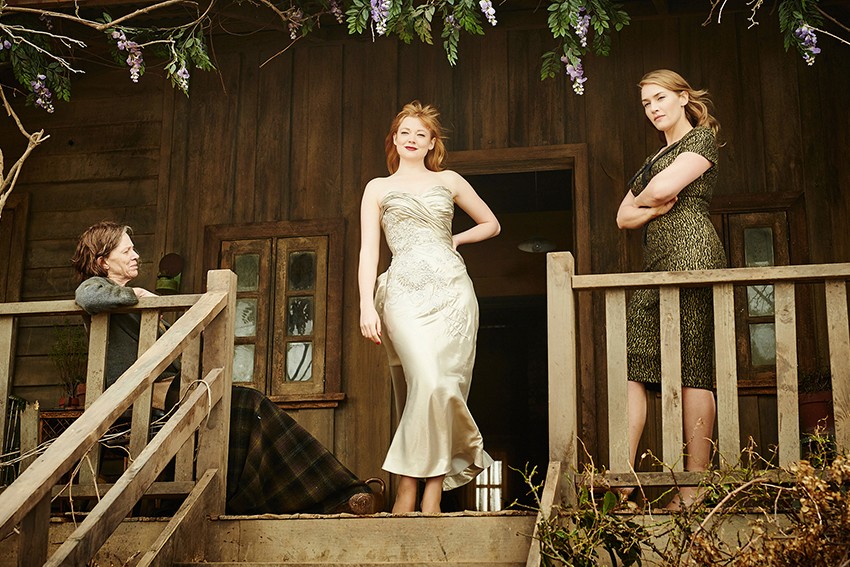Outback Glamour

Jocelyn Moorhouse makes a strong comeback to the world of directing after a 13–year hiatus with her triumph that is The Dressmaker.
Featuring a cast of celebrated actors including Kate Winslet, Judy Davis, Hugo Weaving and Liam Hemsworth alongside up-and-coming South Australian starlet Sarah Snook, The Dressmaker is a quintessentially Australian take on revenge, love and creativity. Fused with poignancy, hints of absurdity, and some lighthearted comedy, the film takes its viewers on a two-hour emotional journey that will leave you gasping for breath between bursts of laughter one minute and fumbling for the tissues the next. The glamorous Tilly Dunnage (Winslet), trained as a couturier in Paris, returns to her middle-of-nowhere hometown of Dungatar in 1951. After 20 years away, Tilly is determined to right the wrongs of her past while exacting revenge on the bitter and small-minded townsfolk who exiled her as a child for a crime she can’t remember committing. Tilly gains leverage over the superficial inhabitants of the town by designing extraordinary gowns for them and extracting the information she needs to piece the truth of her past together. Based on Rosalie Ham’s best-selling novel of the same name, Moorhouse worked on the screenplay with husband P.J. Hogan, director of Peter Pan (2003) and Muriel’s Wedding (1994). Moorhouse was initially drawn to adapting Ham’s novel to a screenplay largely because of the characterisation. “The novel is a great read,” Moorhouse tells The Adelaide Review. “It starts off so brilliantly with this stranger stepping off a bus dressed in the most gorgeous high fashion. It’s a great way to begin.” Moorhouse quickly grew fond of the vibrant patchwork of personalities in Ham’s book, reflected throughout the film in masterful interpretations of characters such as the flamboyant Sergeant Farrat (Hugo Weaving) with a penchant for luxuriant fabrics and garments. “As a director, I quickly realised these are fantastic roles, and that I would be able to cast brilliant people in them.” In terms of adapting the novel to a screenplay, Moorhouse states that she wanted to emphasise the unravelling of Tilly’s enigmatic past. “I wanted to extend the mystery so that it would go right the way through the movie,” she says. “We [Hogan and Moorhouse] also made the decision to boost some characters, like Teddy and Molly. A movie is a very different medium to a book so you have to shape the material in a different way, and that’s part of the fun.” Establishing the film’s remarkable cast was a matter of contacting the actors Moorhouse thought best suited to the role. “My favourite part about directing [is] finding the actors who will go on this journey with me. I had my list of favourites who I [thought would] be exquisite, so the main roles were filled by simply offering the roles to these geniuses.” And ‘geniuses’ is not an overstatement — Winslet’s portrayal of the fierce, wilful yet vulnerable Tilly is first-rate and entirely captivating, while Hemsworth brings a raw and genuine true-blue tenderness to the screen as Teddy. However, Davis’s interpretation of ‘Mad Molly’ — the acerbic, forthright, yet deeply compassionate mother of Tilly — is both hilarious and emotionally charged, and marks an ultimate highlight of the film. For a film titled The Dressmaker, it is obvious that costuming must play a crucial role. Moorhouse discloses that the costumes were indeed designed with painstaking attention to detail, and that each character’s garb reflected something unique about them. “I made six books of photographs from the Vogue archives. It was so inspiring to see all of those incredible frocks in the 50s, from Chanel to Dior and Balenciaga,” she says Marion Boyce, best known as costume designer for Miss Fisher’s Murder Mysteries, was responsible for the mammoth task of designing 350-odd costumes for the entire cast (including the magnificent frocks donned by the Dungatar townsfolk), while Margot Wilson was appointed the role of Winslet’s personal designer. “Tilly’s clothes had to be very elegant and chic but not too flashy — designers tend to make the flashier stuff for their clients and dress in a more chic and understated way themselves,” stresses Moorhouse in the film’s production notes when explaining Wilson’s role in the crew. Despite the entertaining and, at times, uproarious dialogue, the film addresses some heavy themes including rape, trauma and mental illness, which required a delicate approach on the part of Moorhouse. When asked how she managed to find the balance between pathos and hilarity, Moorhouse replies, “I see life that way — it’s a mix between comedy, tragedy and surprises. I’ve always written that way.” The film itself is difficult to pin — viewers should expect a dynamic amalgam between a spaghetti western fused with magical realism, influenced by the genre-bending ways of the Coen brothers. Think Sergio Leone meets Christian Dior in the Australian outback, and you will get something near to The Dressmaker. The Dressmaker is in cinemas now